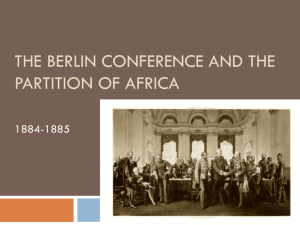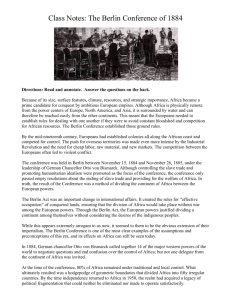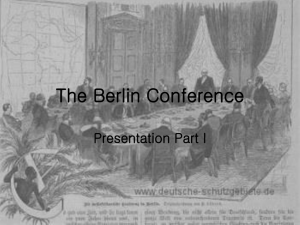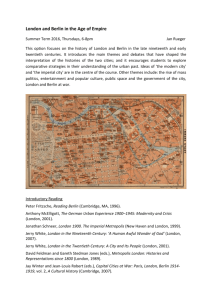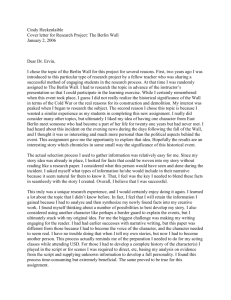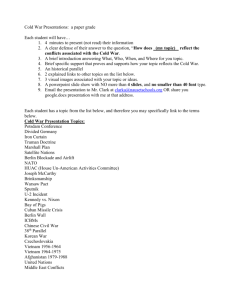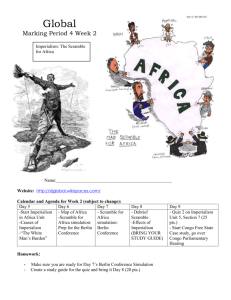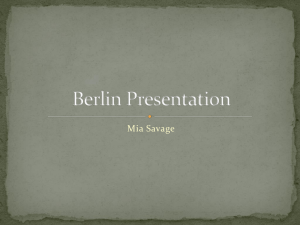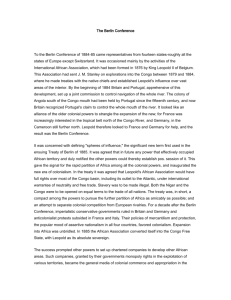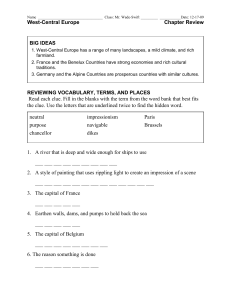THE BERLIN CONFERENCE
advertisement
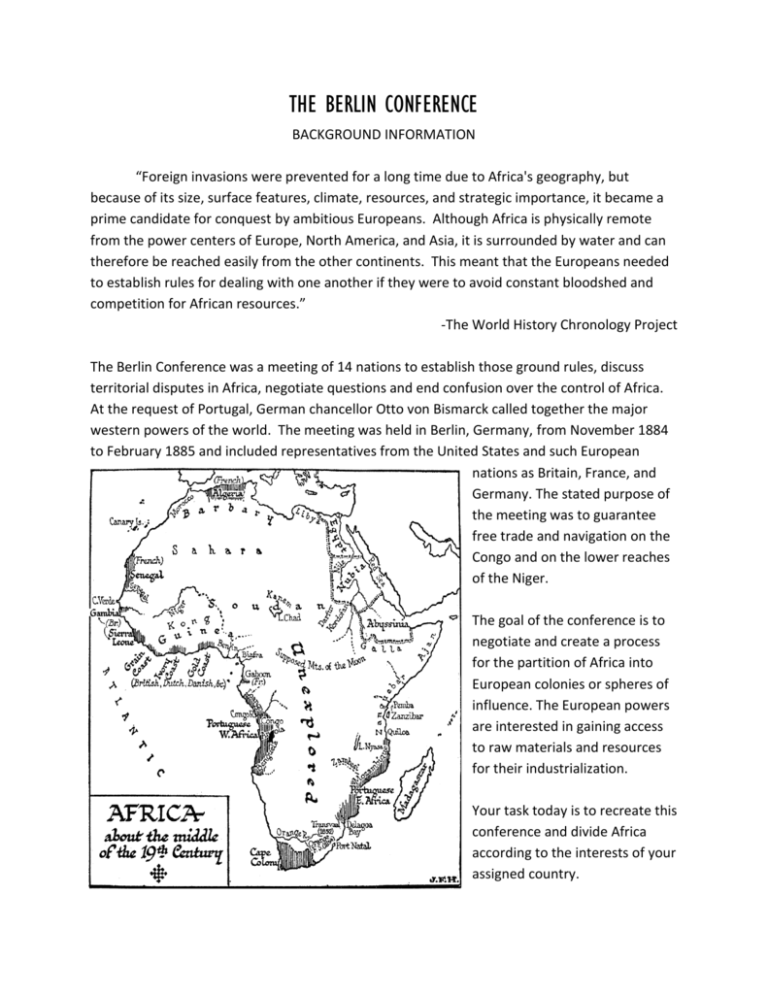
THE BERLIN CONFERENCE BACKGROUND INFORMATION “Foreign invasions were prevented for a long time due to Africa's geography, but because of its size, surface features, climate, resources, and strategic importance, it became a prime candidate for conquest by ambitious Europeans. Although Africa is physically remote from the power centers of Europe, North America, and Asia, it is surrounded by water and can therefore be reached easily from the other continents. This meant that the Europeans needed to establish rules for dealing with one another if they were to avoid constant bloodshed and competition for African resources.” -The World History Chronology Project The Berlin Conference was a meeting of 14 nations to establish those ground rules, discuss territorial disputes in Africa, negotiate questions and end confusion over the control of Africa. At the request of Portugal, German chancellor Otto von Bismarck called together the major western powers of the world. The meeting was held in Berlin, Germany, from November 1884 to February 1885 and included representatives from the United States and such European nations as Britain, France, and Germany. The stated purpose of the meeting was to guarantee free trade and navigation on the Congo and on the lower reaches of the Niger. The goal of the conference is to negotiate and create a process for the partition of Africa into European colonies or spheres of influence. The European powers are interested in gaining access to raw materials and resources for their industrialization. Your task today is to recreate this conference and divide Africa according to the interests of your assigned country. Berlin Conference Primary Desires ● ● ● ● ● ● ● German Chancellor Bismarck wanted not only to expand German spheres of influence in Africa but also to play off Germany's colonial rivals against one another to the Germans' advantage. Fourteen countries were represented by a plethora of ambassadors when the conference opened in Berlin on November 15, 1884. The countries represented at the time included Austria-Hungary, Belgium, Denmark, France, Germany, Great Britain, Italy, the Netherlands, Portugal, Russia, Spain, Sweden-Norway (unified from 1814-1905), Turkey, and the United States of America. Of these fourteen nations, France, Germany, Great Britain, and Portugal were the major players in the conference, controlling most of colonial Africa at the time. The initial task of the conference was to agree that the Congo River and Niger River mouths and basins would be considered neutral and open to trade. At the time of the conference, only the coastal areas of Africa were colonized by the European powers; 80% of Africa remained under traditional and local control. The Berlin conference desired to form a set of rules for the “orderly extension of European influence” in Africa. Controlling the slave trade and promoting humanitarian idealism were promoted as the primary focus of the conference. Africa: Before & After Berlin Map of Africa 1873 Map of Africa 1913 Traditional African Ethnic Boundaries with Modern National Boundaries Berlin Conference Discussion Questions 1. There were two WWI “preventative issues” at the conference: 1-Bismarck wanted his potential enemies to be occupied outside of Europe, and 2-Bismarck wanted to prevent off-continent wars between colonial powers. a. Were these good goals for Germany? b. for Europe? c. To what extent do you feel they were successful in delaying total war in Europe? d. To what extent do you feel they accelerated total war in Europe? 2. To what extent do you agree with the statement, “The Berlin Conference is one of the most clear examples of the assumptions and preconceptions of this era, and its effects on Africa can still be seen today.” 3. Disregarding the benefits of historical hindsight: if you were a European citizen in 1885, how do you think you would feel about the humanitarian aspects of the General Act of the Berlin Conference? (anti-slavery, colonial powers must protect and support natives, freedom of religion, free centers of cultural and scientific exchange, etc...) a. Define how your opinion might be different depending on which European country you lived in. b. If you were an African citizen, how might you feel about the humanitarian aspects of the General Act? 4. What would you say were the 3 main purposes of the Berlin Conference? 5. Look through the notes to determine what the European powers officially stated as the purposes of the Berlin Conference. Were these their real purposes? 6. Based on your pre-reading, how does knowledge of the tragedy that the “Congo Free State” affect your analysis this decision? 7. Hypothetically speaking, do you think a similar conference could be held today? Would the nations of the modern world meet to discuss how to divide up and control another region of the world? Why or why not?
